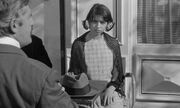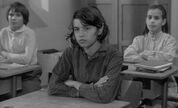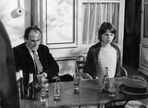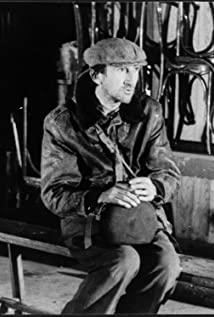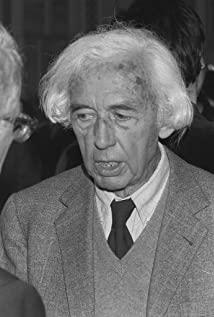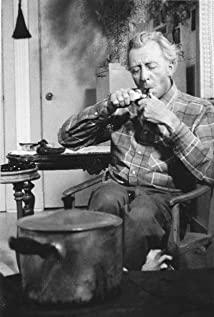Text/Zhang Qian
As Luc Godard said, " Bresson is to French film what Mozart is to Austrian music, and Dostoevsky is to Russian literature ",
Robert Bresson’s films are not only in a dialogue with himself, but also on the road of exploring the essence of human spirit . The mysterious and introverted atmosphere in his films is worthy of our constant understanding.
Lonely chant | "Muchette"
one
The movie "Muchette" is Bresson's second novel adapted from the French theological writer Bernanos. In "Diary of a Country Priest", Bresson’s concept of literary adaptation is: the reality of an excellent literary work is the work itself, the description of literary works cannot be separated from the words, in order to be faithful to the original work, it is necessary to grasp the backbone of the language .
Therefore, in "Diary of a Country Priest", not only has a large number of voiceovers, but most of the narration content is also loyal to the original literary work.
"Muchette" stills
Compared with the adaptation of "The Diary of a Country Priest", after 16 years, Bresson has a bolder and unique interpretation of the film adaptation. In "Muchette", Bresson will still retain a small amount of narration, especially at the beginning of the film, the confession of Muchet's mother in the church directly pave the way for an atmosphere of sorrow.
However, in this film, Bresson has more of his own stylized elements, and his loyalty to the essence of the original works more to serve deep-level spiritual exploration and soul activities .
Stills from "Diary of a Country Priest"
Bresson made a particularly shocking adaptation of the novel's ending, and it was this finishing touch that made the ending a French film history classic comparable to the boy running to the beach in "Four Hundred Strikes". In the original work, Muschett met an old man riding a horse before he threw himself into the lake. In the film, Bresson arranged for a farmer in a tractor to be the last object Muschett met, which was closer to the environment of the filming era.
At the same time, replacing horses with cold farming machines can better highlight the old peasant's "as cold as horses" eyes in the original work. In addition, Bresson also asked Mouchet to make three landslide attempts to throw the lake into the lake, and deleted the description of the scene after falling into the water in the original work, and replaced it with a deadly silent lake to highlight the " collapse of life. "
Bresson (picture) / Baidu Encyclopedia
two
Muschett is lonely. Her loneliness stems from the contradiction between innocent nature and the world. It is this unreconcilable loneliness that pushes her to self-drowning.
Muschett’s innocence was expressed by Bresson in various details, whether it was humming a little tune to make coffee and doing housework, stomping his feet in front of a pile of mud, or throwing a rag willfully after working in a pub. A little girl has the qualities of a free child, but unfortunately, the world around her is secular and even ruthless.
"Muchette" stills
At home, at the beginning of the film, Bresson gave us the role of a pessimistic mother (sitting on a stool, confessing and worrying about his serious illness). When his mother was sick and lying in bed, Muschett could only get warmth from the moment of kissing his mother’s hands. Most of the love between mother and daughter was immobile . Even on the night when Muschett was raped and returned, her sorrow could not be resolved. I still have to face the crying baby, and I have to find alcohol for my mother.
"Muchette" stills
If the mother can provide Muschett with hands for kissing, the father's hands are even colder and ruthless. From the front of the church, he pushed Musette fiercely to the holy water, and slapped the flames of love like Musette with two slaps on the side of the playground.
His father was like a hunter in Mushait's life . When Mushait had any behavior against the world, his hands began to "hunt" him. At the end, when Muschett went out for milk, his father did not forget to complain, "I used to be a very good child", and the father and daughter were never able to communicate or reconcile.
"Muchette" stills
The worldly ruthlessness also comes from the fierce eyes of the teacher in the classroom, the wanton sexual humiliation of the boys on the street, and the stinging words of the lady of the grocery store, and so on . Faced with such contradictions, Muschett instinctively wanted to resolve the loneliness that no one talked about, and even resentment.
As a result, the soil of the earth seemed to be the object of Muschett’s vent, wearing big-size shoes stepping on muddy water; or hiding under the slope and throwing clods at the secular girls again and again, spraying perfume, Chasing the boy, these are incomprehensible to Musette, she only has her own world and loneliness until that stormy night.
"Muchette" stills
On that night, Musette and Arushanu built a bridge of communication to reconcile with loneliness, not only because Arushanu made Mushait feel superficial love and care, but also because Mushait was a poacher. A witness to the change in the relationship between Arushannu and the forest ranger Ma Qiu, she understands that Arushannu may be similar to her own distress.
Therefore, when Arushannu was worried about drinking bitter wine in the hut, Muschet comforted the companion: "It should be fine, trust me." When Arushanu fell down after a seizure, Mouchette got out of silly Pa wipe his mouth foam, sang his own music lessons offensive chants,
"Let us be full of hope, let us point to the sky till the end of the horizon", the poachers recovered under the melodious singing and the calm eyes of Muschett.
"Muchette" stills
Muschett is always innocent. When the poachers wanted to send him home, Muschett still did not forget his insistence on the truth, insisted on everything he saw, and questioned Arushanu about being victimized by the trap. Mr. Ma Qiu, such redundant words also made the poachers finally raped.
The next day, the sudden death of his mother caused poor Muschett to lose the only hands he could snuggle on. When he came to the forest ranger's home, when Muschet learned that Arushanu was arrested, he faced the questioning of the forest ranger's wife and the temptation of money. Muschet proudly claimed to be "I am Aru's woman" and defended the truth. And facts.
"Muchette" stills
Desperate Muschett passed the hunting ground with the shroud given by the old lady, thinking of his Arushanu, or seeing his destiny in the struggling hare, we don't know. However, in front of the calm lake, Muschett chose the most ritual death for himself. She wrapped up her mother's shroud, rolled down from the hillside, drowned herself, without a trace of struggle, leaving only the shroud hanging on the thorns on the shore.
This ending is as stated in the documentary "Road to Bresson", "It makes people feel that emotions are wrapped in the heart and difficult to release. After waiting for a long time, suddenly, the emotions are released, but they are Calm", the peace at the end of Muschett simply came after the ripples on the surface of the water.
"Road to Bresson"
three
Bresson once left his own handwritten notes in the beginning of the death row prison escape: "What you will see is a true story, I shoot it as it is, without modification." This is also the aesthetic concept that runs through all of Bresson's films—— The unremitting pursuit of film simplicity. Such "authority" and persistence in his own style are also one of the main reasons why New Wave rebel boys give Bresson's films extremely high ratings and are even regarded as spiritual mentors.
There is nothing superfluous in Bresson's shots. Each shot is so simple that it only expresses what he thinks is important. As the saying goes, "less is more". In Muschett, when the father who sells smuggled alcohol avoids being caught by the police, the director only focused the shot on the double covering the bottle curtain and showed the whole process.
Similarly, the director showed the audience the process of Muchet throwing clods at the girls with only two fixed shots. One shot was aimed at Muchet in the grass, and the other shot was a close-up shot of the clod hitting. . At the same time, the sound and the video are matched. Except for the smashing sound of the soil block, the girls who were hit did not make a sound and left in silence.
"Muchette" stills
The last three landslides and drowning scenes, simply focus on the rolling down Muschett with the camera. After the sound of falling water, the picture freezes in the rippling pond until the water waves slowly disappear, and the silence is suffocating.
The pursuit of simplicity is also the pursuit of the refinement and preservation of art. Bresson weakened the role of scripts and actors. In his opinion, "actors" are the products of theater, and movies need "models", so in Mucher In the special case, the actor's expressions are very restrained, and the movements are even slightly rigid. This kind of processing may be difficult to express complex inner activities, but Bresson uses regular repetition to show a unique mood.
In the film Muschett, many scenes appear twice or more, including Muschett throwing clods at girls, boys humiliating Muschett, babies crying constantly at home, etc. The repeated techniques include A sense of heaviness that transcends the individual, and behind the repetition actually implies the constantly changing course of the soul.
"Muchette" stills
Four
Bresson’s cold and severe asceticism style has formed his unique movie theme. As a "poet" who chants the suffering of the world, most of the characters in Bresson’s works accept suffering in the depths of their souls. Challenge.
When Muschett tried to drown himself for the second time, he was blocked by thorns, and after falling into the water for the third time, he left the shroud hanging on the thorns. The aesthetic value of this metaphor is derived from a certain theological significance. In the Bible, thorns are plants that grew out of the cursed earth after Adam and Eve sinned, symbolizing sin or suffering.
According to the doctrine of Christ or Catholicism, each of us comes with original sin. Death does not simply mean liberation. If the young girl Muschet wants to obtain peace of soul through death, then she must have "atoned for sins" in the world. ", must endure suffering and overcome suffering (thorns).
Therefore, we see that only Muschett left his mother's shroud on the thorns, and only to put aside everything in the world, can we truly embrace the salvation of the soul.
"Muchette" stills
five
Bresson once mentioned that Mouchet is a symbol of an angel. In my opinion, when Muschett sang a hymn to the thief from the heart, she had completed the redemption and received God's favor.
In addition to "Girl Muschett", Bernanos' early work "Under the Sunshine of Satan" (adapted into a film by director Piara in 1987) also portrays a girl Musette who has endured torture.
Bernanos himself wrote on the front page of the book: "Muchette in "The Girl Musette" and Musette in "Under the Sun of Satan" have only one thing in common: both are at the extreme. I spent my whole life in great loneliness."
"Girl Muschett"
Perhaps, the Mouchets, who are full of suffering, really carry a trace of the afterglow of the fallen angel Satan, but they can hear the chant that is closest to heaven.
-END-
Author|Zhang Qian
A student at Zhejiang University, majoring in electrical,
Minor in drama, film and television literature.
"Come on, learn mathematics" from the founder of the media.
Welcome to pay attention to the official account "put away the book" (paokaisb)
Book theater, sensual thoughts
View more about Mouchette reviews



